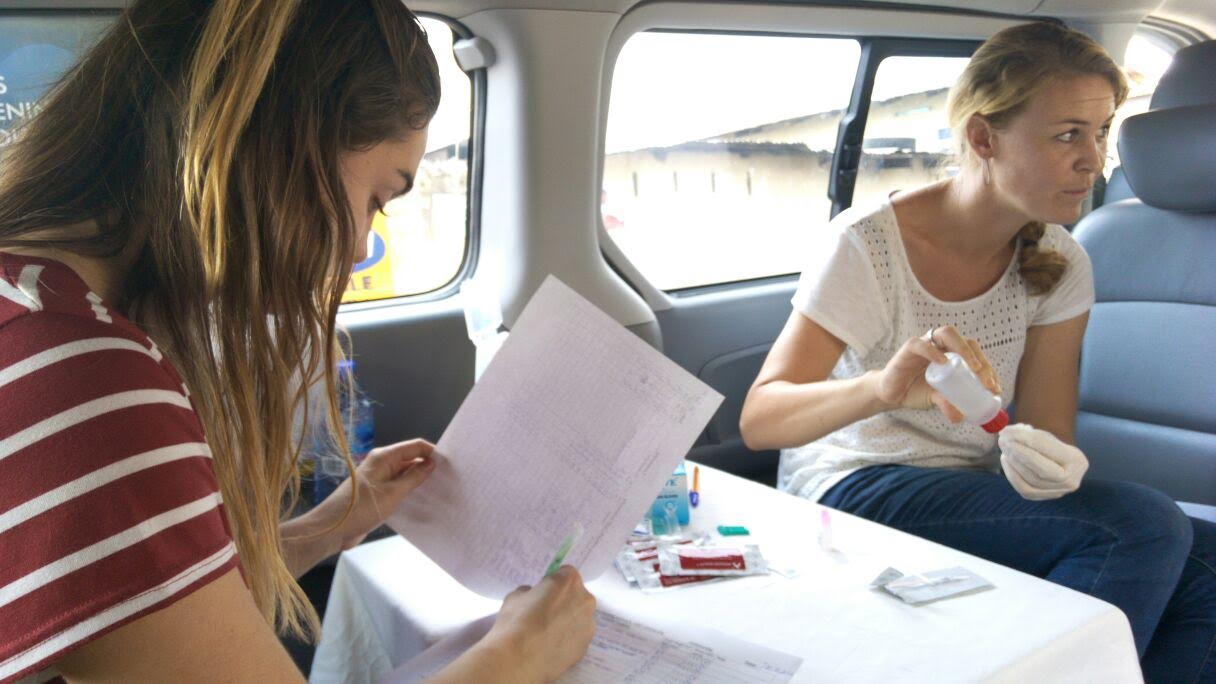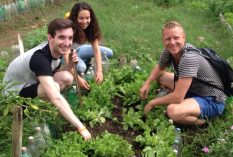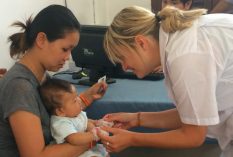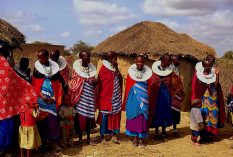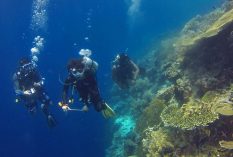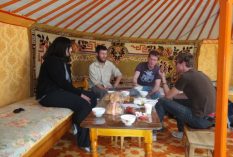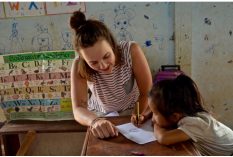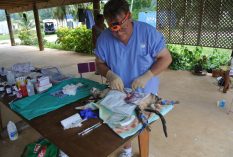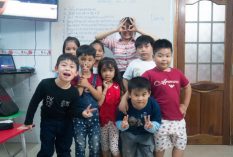Entry #1
My decision to pursue a Global Public Health Internship with the West Africa AIDS Foundation (WAA F) and International Healthcare Center (IHCC) in Accra, Ghana via Global Nomadic emerged for various reasons. To begin, during my undergraduate education at the College of Charleston, I majored in Public Health, and minored in Women’s and Gender Studies. Upon my recent graduation, I recognized that my public health education and career qualifications would benefit greatly from the opportunity to partake in a global health research and outreach program. I was drawn to WAAF specifically, due to: positive reports of prior
interns, varied ongoing projects available to partake in, and overall flexibility of the internship program.
Global Nomadic made the communication and logistic process of my internship commitment hassle-free. My experience working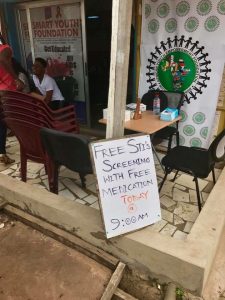 with WAAF and living in Accra in general have exceeded my original expectations. I would highly recommend this internship for students studying public health and/or medicine who are interested in gaining global health field experience.
with WAAF and living in Accra in general have exceeded my original expectations. I would highly recommend this internship for students studying public health and/or medicine who are interested in gaining global health field experience.
To begin, I arrived in Accra, Ghana in the second week of January. The travel process from the U.S. to Ghana was hassle-free, due to the fact that it was organized via Global Nomadic and The Aya Centre, the Center for Intercultural Awareness and Development, where I currently reside in Accra. Prior to my arrival, I was emailed a photograph of the driver who would pick me up from the airport. Additionally, within the first few hours of my arrival, I was given the opportunity to purchase groceries and exchange currency. Lastly, the staff members at The Aya Centre provided me with a short orientation which discussed cultural norms, proper healthcare/sanitation practices, and transportation services. Overall, my travel process from the U.S. to Accra was both informative and easy-going.
Similarly to this original orientation, my internship orientation at WAAF was stress-free, due to the fact that a staff member at The Aya Centre accompanied me on the correct bus route on my first work day. During my internship orientation, I was asked to speak to my particular interests/public health areas of focus, and my work schedules/assigned tasks were adjusted accordingly. The WAAF staff were incredibly welcoming and friendly, encouraging me to bring my ideas and pursue them during my time in Accra.
Entry #2
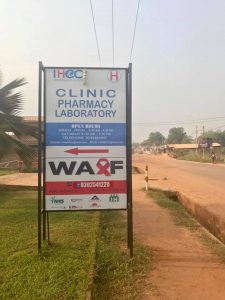 My initial public health field experience as an intern with the West Africa AIDS Foundation (WAAF) and International Healthcare Centre (IHCC) in Accra, Ghana, occurred when I attended MSM Peer Educator Training, a residential training with the purpose of educating community peer educators on topics including, yet not limited to: HIV/AIDS, STIs, gender-based violence, condom and lubricant use, reproductive anatomy, and communication skills. The overall purpose of this training is to provide peer educators with skills necessary to reach out to their fellow peers with services under the USAID Strengthening Care Continuum Project.
My initial public health field experience as an intern with the West Africa AIDS Foundation (WAAF) and International Healthcare Centre (IHCC) in Accra, Ghana, occurred when I attended MSM Peer Educator Training, a residential training with the purpose of educating community peer educators on topics including, yet not limited to: HIV/AIDS, STIs, gender-based violence, condom and lubricant use, reproductive anatomy, and communication skills. The overall purpose of this training is to provide peer educators with skills necessary to reach out to their fellow peers with services under the USAID Strengthening Care Continuum Project.
To begin, the MSM Peer Educator Training session occurred over a five-day period, covering specific areas of focus each day. The first session discussed: goal setting/expectations, behavior change strategy, interpersonal communication skill building, and the qualities of a peer educator. The second session portrayed reproductive anatomy and HIV/AIDS. The third session illustrated STIs and condom/lubricant use. The fourth session covered testing and counseling and stigma activities. Finally, the fifth session portrayed: monitoring and evaluation, work plan development, and workshop evaluation.
To continue, the learning style of the training was discussion-based, thus allowing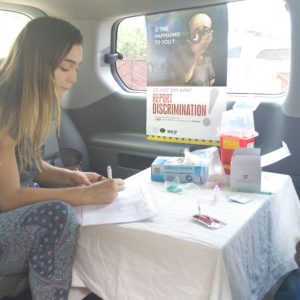 participants to share their experiences and opinions with one another. This forum was very beneficial, particularly because the stigma that Ghana’s LGBTQ community faces, was described by individuals who experience this stigma first-hand. In addition, the MSM Peer Educator Training illustrated the most common public health issues KP’s face, such as: lack of condom use, reports of multiple sexual partners, and lack of routine HIV/AIDS & STI screenings. Learning about these sexual and reproductive health facts/policies, as well as the related communication skills and characteristics that peer educators must portray in order to successfully perform their assigned duties, enlightened me of the actions I should continue to engage in throughout my future public health career, in order to promote healthy sexual and reproductive habits among KP’s.
participants to share their experiences and opinions with one another. This forum was very beneficial, particularly because the stigma that Ghana’s LGBTQ community faces, was described by individuals who experience this stigma first-hand. In addition, the MSM Peer Educator Training illustrated the most common public health issues KP’s face, such as: lack of condom use, reports of multiple sexual partners, and lack of routine HIV/AIDS & STI screenings. Learning about these sexual and reproductive health facts/policies, as well as the related communication skills and characteristics that peer educators must portray in order to successfully perform their assigned duties, enlightened me of the actions I should continue to engage in throughout my future public health career, in order to promote healthy sexual and reproductive habits among KP’s.
To conclude, my experience as a contributor to the MSM Peer Educator Training session was both informative and uplifting. This training allowed me to advance in specific public health areas, such as: LGBTQ health, HIV/AIDs, STIs, sexual health, and reproductive anatomy. Most importantly, I was further informed of strategies I can utilize in order to address stigma among particular communities. All in all, both the connections I had the pleasure of making, and overall content discussed during the training, have served as motivation to continue to work with the LGBTQ community throughout my future public health career.
Entry #3
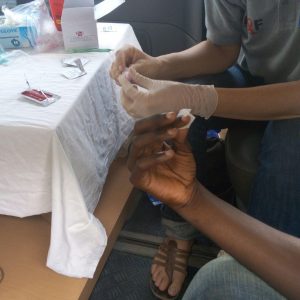 My second major public health field experience as an intern with the West Africa AIDS Foundation (WAAF) and International Healthcare Centre (IHCC) in Accra, Ghana, occurred when I attended the “Human Rights Education for Health Workers Conference” in the Cape Coast Region. The purpose of this conference was to improve access to LGBT rights and health care in selected regions of Ghana. In addition to improving my public health knowledge, this event provided me with the opportunity to witness cultural beliefs/differences first-hand, thus making me aware of strategies I can utilize in order to address cultural differences throughout my future public health career.
My second major public health field experience as an intern with the West Africa AIDS Foundation (WAAF) and International Healthcare Centre (IHCC) in Accra, Ghana, occurred when I attended the “Human Rights Education for Health Workers Conference” in the Cape Coast Region. The purpose of this conference was to improve access to LGBT rights and health care in selected regions of Ghana. In addition to improving my public health knowledge, this event provided me with the opportunity to witness cultural beliefs/differences first-hand, thus making me aware of strategies I can utilize in order to address cultural differences throughout my future public health career.
After a two hour drive to Cape Coast with selected WAAF staff members, I arrived at the Pempamsie Amsie Hotel, where the conference was held. Three speakers and around twenty healthcare workers present. In order to begin this event, the health care workers and myself engaged in a mobile activity. A statement relating to LGBT rights was displayed on the flatscreen. Once the statement was read out loud, participants traveled to a designated corner of the room, indicating that they either: “strongly agreed, agreed, disagreed, or strongly disagreed” with the displayed statement. Some examples of these statements included: “Homosexuality is illegal in Ghana,” and “LGBT patients should be treated with equal respect as their heterosexual neighbors.” This activity exposed me to a plethora of information regarding LGBT rights and stigma in Ghana. Most importantly, I learned that homosexual relations are not illegal in Ghana, however, the physical act of anal sex is; as a result of this law, a great deal of stigma is associated with LGBT individuals, specifically MSM’s.
In order to continue addressing this heated issue, a second speech was given by a WAAF nurse. Her discussion covered many topics, including: common health issues/complaints expressed by LGBT individuals, external and internal stigma, and the overall professional protocol that should be utilized in order to address needs of LGBT individuals seeking health care treatment. The most vital take-home message that I gathered through this speech was that: the stigma associated with LGBT individuals residing in Ghana is so extreme, that these individuals often feel ashamed, and as a result, do not visit health care services in fear that their sexual orientation will be exposed to the public. This is incredibly problematic because it leads to untreated infections (such as sexually transmitted infections), and thus, increases the likelihood that these infections will continue to spread throughout communities. As a result of this issue, public health professionals and healthcare workers have a vital responsibility to both practice and preach the importance of treating LGBT individuals with respect, in an effort to decrease rates of stigma and disease.
In conclusion, the Human Rights Education for Health Workers Conference was both an informative and eye-opening experience. In addition to improving my public health knowledge, this event provided me with the opportunity to witness cultural beliefs/differences first-hand, thus making me aware of strategies I can utilize in order to address cultural differences throughout my future public health career.
Entry #4
 Through my current internship with the West Africa AIDS Foundation (WAAF) and International Healthcare Centre (IHCC) in Accra, Ghana, I have had the pleasure of partaking in the “IMPROVING ACCESS TO LGBT RIGHTS AND HEALTH CARE” project. WAAF, in collaboration with the Human Rights Advocacy Centre (HRAC) have created this project, with an ultimate goal of, “increasing empowerment of the target population, as well as providing free, friendly and professional services. WAAF brings the services to the door steps of the target population by providing a mobile outreach event. The outreach focuses on STI screening and treatment services, including HIV testing and counseling.” Through my involvement with this ongoing project, I have gained the opportunity to travel throughout Accra, as well as shadow the STI/HIV counseling process.
Through my current internship with the West Africa AIDS Foundation (WAAF) and International Healthcare Centre (IHCC) in Accra, Ghana, I have had the pleasure of partaking in the “IMPROVING ACCESS TO LGBT RIGHTS AND HEALTH CARE” project. WAAF, in collaboration with the Human Rights Advocacy Centre (HRAC) have created this project, with an ultimate goal of, “increasing empowerment of the target population, as well as providing free, friendly and professional services. WAAF brings the services to the door steps of the target population by providing a mobile outreach event. The outreach focuses on STI screening and treatment services, including HIV testing and counseling.” Through my involvement with this ongoing project, I have gained the opportunity to travel throughout Accra, as well as shadow the STI/HIV counseling process.
To begin, the mobile clinic screening events most commonly occur on the weekends, in hopes that the turnout will be large. During these screenings, I sit in the back of the WAAF truck with a certified nurse, and together we wait for individuals to enter the truck, and receive their free HIV/STI screenings. My specific responsibilities during this process are to collect contact information of the individuals, as well as shadow the nurse in practicing professional sexual education counseling. For example, I begin the session by asking the current individual for his/her name, age, phone number, sexual orientation, history of STI’s, and whether or not the patient has previously had an HIV screening.
To continue, once this basic information is collected, the nurse will perform the HIV immediate- response screening by drawing a small prick of blood from the patient’s finger. Once the (either positive or negative) result of the HIV test is determined, the nurse will provide counseling to the individual. Throughout my three experiences at the mobile clinic, we tested around 120 patients, with only three being HIV positive. I found it informative to have the opportunity to shadow the counseling process of both positive and negative individuals; it was important to see the differences in these counseling approaches.
Kate C. 2017

